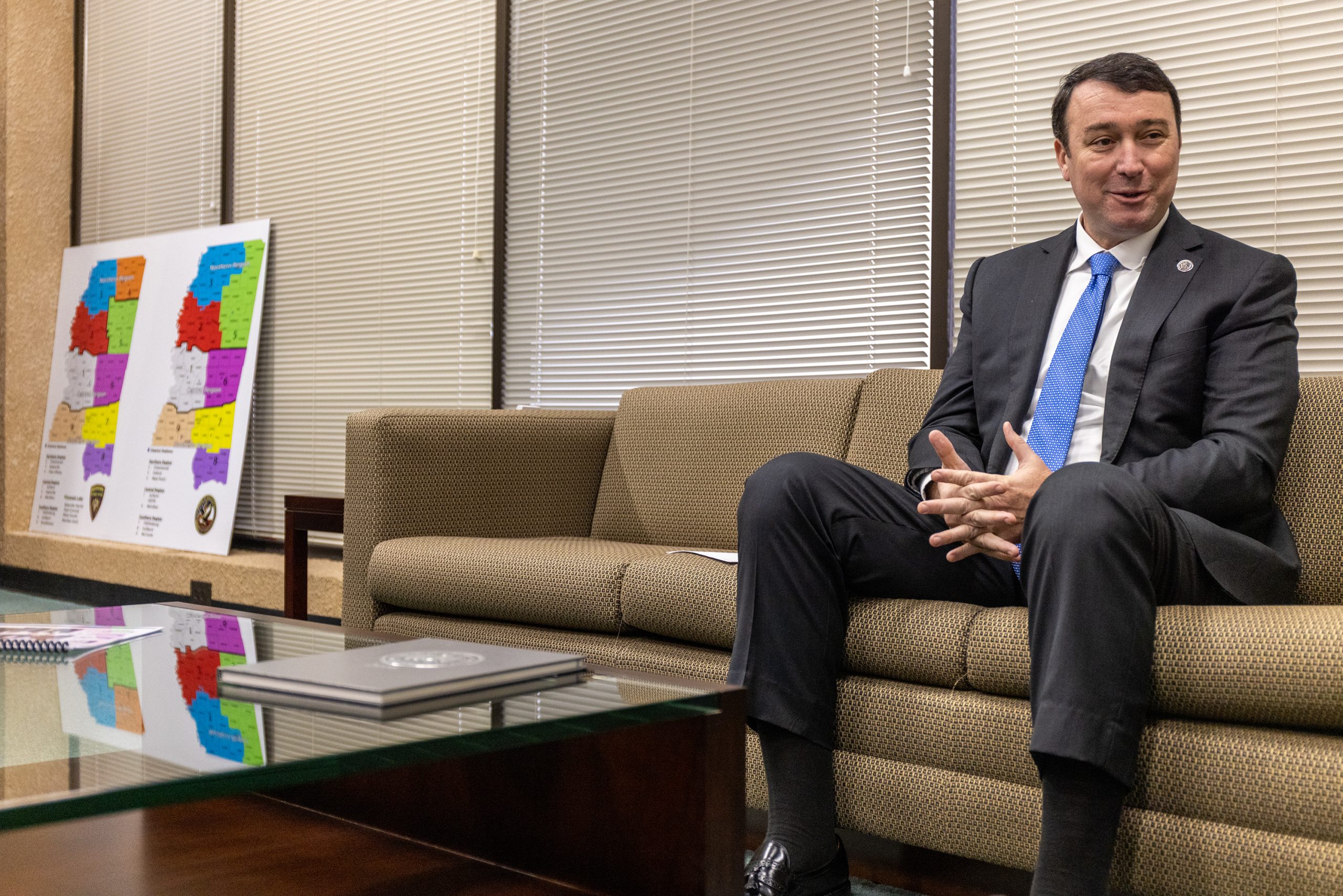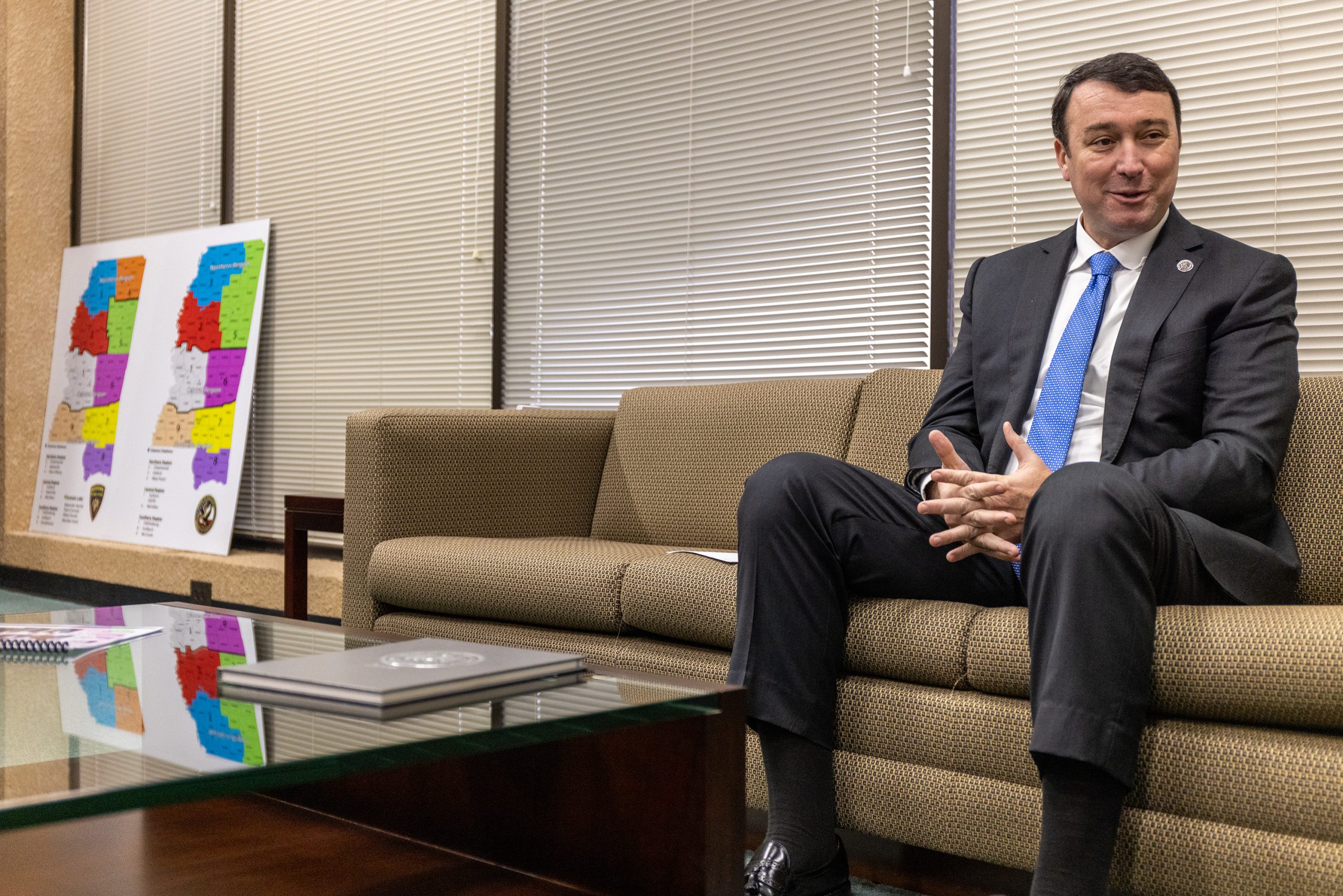Mississippi Today
Bill seeks to keep public at a distance in videoing law enforcement actions


Bill seeks to keep public at a distance in videoing law enforcement actions
Anyone who video records Mississippi law enforcement during the performance of their duties in a public space could face a fine and jail time if they are less than 15 feet away, under a bill before the Legislature.
House bill 448 by Rep. Jill Ford, R-Madison, would make it a misdemeanor offense and set a fine for anyone who knowingly records law enforcement activity while less than 15 feet away after an officer has given “a clear, verbal instruction” to step back.
Ford referred comment about the bill to Department of Public Safety Commissioner Sean Tindell, and also reached out to him for input. Tindell said the legislation would provide guidance to the public and law enforcement that 15 feet is the minimum for a perimeter, which would allow an officer to work without interference and a person to record.
“Fifteen feet is five steps. There is nothing that they can’t still record from five steps away,” Tindell told Mississippi Today. “It’s close enough if you want to film the interaction with law enforcement.”
Videotaping law enforcement during arrests has intensified in the wake of the 2020 death of George Floyd in Minneapolis. A teenager captured cellphone video of Derek Chauvin kneeling on Floyd’s neck as he pleaded for his life, and that video became the key to a murder conviction for the former police officer.
The Mississippi bill states that it will not create a right or authorize anyone to record law enforcement activity.
That right already exists within the First Amendment and case law, including a 2017 5th U.S. Circuit Court of Appeals decision stating the First Amendment covers an individual’s right to record the police while they carry out their duties.
“Filming the police contributes to the public’s ability to hold the police accountable, ensure that police officers are not abusing their power, and make informed decisions about police policy,” the court wrote in its decision. “Filming the police also frequently helps officers; for example, a citizen’s recording might corroborate a probable cause finding or might even exonerate an officer charged with wrongdoing.”
Tindell said the bill is in response to an Aug. 5 interaction in McComb between Eugene Lewis, a Black man, and Mississippi Highway Patrol Trooper Hayden Falvey, who is white.
One of Lewis’ brothers, Packer Lewis, recorded a 5-minute Facebook video that shows Falvey dragging Eugene Lewis a few feet, wrestling him onto the grass and holding Lewis down with a knee.
Several times Packer Lewis talks to the trooper and the trooper tells him to stay back, including after Packer Lewis steps closer. After the trooper put Eugene Lewis into his car, Falvey arrested Packer Lewis and another brother at the scene, Darius Lewis.
A week later, DPS released a statement and 40 minutes of camera footage of the incident and said an internal investigation of the trooper didn’t find evidence of criminal conduct against Eugene Lewis.
The agency said Falvey stopped the car for speeding and other traffic violations. The trooper also smelled burned marijuana and saw Eugene Lewis’ eyes were glassy and bloodshot, according to the statement.
“It created somewhat of a potentially volatile situation,” Tindell later told Mississippi Today about the behavior of Eugene Lewis’ brothers at the scene and the trooper not being able to maintain a perimeter.
Existing case law allows law enforcement to set reasonable perimeters, and Tindell said sometimes there is a need for a greater distance, such as at a crime scene, which can be a 50-foot perimeter.
Under HB 448, a person could face up to six months in county jail and/or a fine between $500 and $1,000. The fine and jail time doubles for additional convictions.
There are exceptions in the bill: Recording from under 15 feet can happen during a traffic stop by the driver or passengers and while on private property in an enclosed structure with authority from the owner.
Tindell said DPS trains its officers about citizens’ right to record and how to establish a perimeter to conduct an investigation. If the bill passes, the only thing that will change for the agency is the ability to teach about the statute and tell law enforcement that they can cite it, he said.
Tindell has spoken with members of law enforcement who said they support the legislation.
“What this bill does, in my mind, is set forth reasonable parameters by which the public is aware as well as the law enforcement officer is aware of each other’s rights and dues,” he said.
The American Civil Liberties Union in Misissippi has a resource on its website about police encounters that includes the right to film, photograph and record the police.
As long as a person does not interfere with police activity or obstruct movements, the person has a right to observe and record events plainly visible in public spaces, according to the guide. A person also doesn’t have to hide the fact they are recording because police don’t have a reasonable expectation of privacy when doing their jobs.
The police can’t demand to see the recording or photo device without a warrant, and they can’t delete the images, videos or recordings, according to the guide.
A representative from the ACLU of Mississippi was not immediately available for comment.
But the national ACLU is challenging a law passed last year in Arizona establishing that a person must stay eight feet away when recording law enforcement.
“This law is a violation of a vital constitutional right and will severely thwart attempts to build police accountability,” the organization said in a statement. “It must be struck down before it creates irreparable community harm.”
As far as Mississippi’s proposed bill, Tindall said it would be up to law enforcement and agencies to use the correct level of discretion with how to apply HB 448. If the bill is passed, a court could determine whether a law enforcement officer misapplied the law and if the officer’s decision went beyond the bounds of reasonableness, he said.
Tindell doesn’t see the Mississippi bill as a threat to the First Amendment or transparency. As DPS commissioner, he said his goal for the agency is transparency to allow for accountability and build trust with the public.
“I’m confident that should (the bill) make it through the process and become law, it will be fully vetted and be a good law in which the public and law enforcement understand and respect,” he said.
HB 448 is under consideration by the Judiciary B Committee. Tuesday is the deadline for all committees to report out bills to be considered by the full House of Representatives or Senate.
This article first appeared on Mississippi Today and is republished here under a Creative Commons license.
Did you miss our previous article…
https://www.biloxinewsevents.com/?p=205880
Mississippi Today
On this day in 1977, Alex Haley awarded Pulitzer for ‘Roots’

April 19, 1977

Alex Haley was awarded a special Pulitzer Prize for “Roots,” which was also adapted for television.
Network executives worried that the depiction of the brutality of the slave experience might scare away viewers. Instead, 130 million Americans watched the epic miniseries, which meant that 85% of U.S. households watched the program.
The miniseries received 36 Emmy nominations and won nine. In 2016, the History Channel, Lifetime and A&E remade the miniseries, which won critical acclaim and received eight Emmy nominations.
This article first appeared on Mississippi Today and is republished here under a Creative Commons Attribution-NoDerivatives 4.0 International License.![]()
Mississippi Today
Speaker White wants Christmas tree projects bill included in special legislative session

House Speaker Jason White sent a terse letter to Lt. Gov. Delbert Hosemann on Thursday, saying House leaders are frustrated with Senate leaders refusing to discuss a “Christmas tree” bill spending millions on special projects across the state.
The letter signals the two Republican leaders remain far apart on setting an overall $7 billion state budget. Bickering between the GOP leaders led to a stalemate and lawmakers ending their regular 2025 session without setting a budget. Gov. Tate Reeves plans to call them back into special session before the new budget year starts July 1 to avoid a shutdown, but wants them to have a budget mostly worked out before he does so.
White’s letter to Hosemann, which contains words in all capital letters that are underlined and italicized, said that the House wants to spend cash reserves on projects for state agencies, local communities, universities, colleges, and the Mississippi Department of Transportation.
“We believe the Senate position to NOT fund any local infrastructure projects is unreasonable,” White wrote.
The speaker in his letter noted that he and Hosemann had a meeting with the governor on Tuesday. Reeves, according to the letter, advised the two legislative leaders that if they couldn’t reach an agreement on how to disburse the surplus money, referred to as capital expense money, they should not spend any of it on infrastructure.
A spokesperson for Hosemann said the lieutenant governor has not yet reviewed the letter, and he was out of the office on Thursday working with a state agency.
“He is attending Good Friday services today, and will address any correspondence after the celebration of Easter,” the spokesperson said.
Hosemann has recently said the Legislature should set an austere budget in light of federal spending cuts coming from the Trump administration, and because state lawmakers this year passed a measure to eliminate the state income tax, the source of nearly a third of the state’s operating revenue.
Lawmakers spend capital expense money for multiple purposes, but the bulk of it — typically $200 million to $400 million a year — goes toward local projects, known as the Christmas Tree bill. Lawmakers jockey for a share of the spending for their home districts, in a process that has been called a political spoils system — areas with the most powerful lawmakers often get the largest share, not areas with the most needs. Legislative leaders often use the projects bill as either a carrot or stick to garner votes from rank and file legislators on other issues.
A Mississippi Today investigation last year revealed House Ways and Means Chairman Trey Lamar, a Republican from Sentobia, has steered tens of millions of dollars in Christmas tree spending to his district, including money to rebuild a road that runs by his north Mississippi home, renovate a nearby private country club golf course and to rebuild a tiny cul-de-sac that runs by a home he has in Jackson.
There is little oversight on how these funds are spent, and there is no requirement that lawmakers disburse the money in an equal manner or based on communities’ needs.
In the past, lawmakers borrowed money for Christmas tree bills. But state coffers have been full in recent years largely from federal pandemic aid spending, so the state has been spending its excess cash. White in his letter said the state has “ample funds” for a special projects bill.
“We, in the House, would like to sit down and have an agreement with our Senate counterparts on state agency Capital Expenditure spending AND local projects spending,” White wrote. “It is extremely important to our agencies and local governments. The ball is in your court, and the House awaits your response.”
This article first appeared on Mississippi Today and is republished here under a Creative Commons Attribution-NoDerivatives 4.0 International License.
Mississippi Today
Advocate: Election is the chance for Jackson to finally launch in the spirit of Blue Origin

Editor’s note: This essay is part of Mississippi Today Ideas, a platform for thoughtful Mississippians to share fact-based ideas about our state’s past, present and future. You can read more about the section here.
As the world recently watched the successful return of Blue Origin’s historic all-women crew from space, Jackson stands grounded. The city is still grappling with problems that no rocket can solve.
But the spirit of that mission — unity, courage and collective effort — can be applied right here in our capital city. Instead of launching away, it is time to launch together toward a more just, functioning and thriving Jackson.
The upcoming mayoral runoff election on April 22 provides such an opportunity, not just for a new administration, but for a new mindset. This isn’t about endorsements. It’s about engagement.
It’s a moment for the people of Jackson and Hinds County to take a long, honest look at ourselves and ask if we have shown up for our city and worked with elected officials, instead of remaining at odds with them.
It is time to vote again — this time with deeper understanding and shared responsibility. Jackson is in crisis — and crisis won’t wait.
According to the U.S. Census projections, Jackson is the fastest-shrinking city in the United States, losing nearly 4,000 residents in a single year. That kind of loss isn’t just about numbers. It’s about hope, resources, and people’s decision to give up rather than dig in.
Add to that the long-standing issues: a crippled water system, public safety concerns, economic decline and a sense of division that often pits neighbor against neighbor, party against party and race against race.
Mayor Chokwe Antar Lumumba has led through these storms, facing criticism for his handling of the water crisis, staffing issues and infrastructure delays. But did officials from the city, the county and the state truly collaborate with him or did they stand at a distance, waiting to assign blame?
On the flip side, his runoff opponent, state Sen. John Horhn, who has served for more than three decades, is now seeking to lead the very city he has represented from the Capitol. Voters should examine his legislative record and ask whether he used his influence to help stabilize the administration or only to position himself for this moment.
Blaming politicians is easy. Building cities is hard. And yet that is exactly what’s needed. Jackson’s future will not be secured by a mayor alone. It will take so many of Jackson’s residents — voters, business owners, faith leaders, students, retirees, parents and young people — to move this city forward. That’s the liftoff we need.
It is time to imagine Jackson as a capital city where clean, safe drinking water flows to every home — not just after lawsuits or emergencies, but through proactive maintenance and funding from city, state and federal partnerships. The involvement of the U.S. Environmental Protection Agency in the effort to improve the water system gives the city leverage.
Public safety must be a guarantee and includes prevention, not just response, with funding for community-based violence interruption programs, trauma services, youth job programs and reentry support. Other cities have done this and it’s working.
Education and workforce development are real priorities, preparing young people not just for diplomas but for meaningful careers. That means investing in public schools and in partnerships with HBCUs, trade programs and businesses rooted right here.
Additionally, city services — from trash collection to pothole repair — must be reliable, transparent and equitable, regardless of zip code or income. Seamless governance is possible when everyone is at the table.
Yes, democracy works because people show up. Not just to vote once, but to attend city council meetings, serve on boards, hold leaders accountable and help shape decisions about where resources go.
This election isn’t just about who gets the title of mayor. It’s about whether Jackson gets another chance at becoming the capital city Mississippi deserves — a place that leads by example and doesn’t lag behind.
The successful Blue Origin mission didn’t happen by chance. It took coordinated effort, diverse expertise and belief in what was possible. The same is true for this city.
We are not launching into space. But we can launch a new era marked by cooperation over conflict, and by sustained civic action over short-term outrage.
On April 22, go vote. Vote not just for a person, but for a path forward because Jackson deserves liftoff. It starts with us.
Pauline Rogers is a longtime advocate for criminal justice reform and the founder of the RECH Foundation, an organization dedicated to supporting formerly incarcerated individuals as they reintegrate into society. She is a Transformative Justice Fellow through The OpEd Project Public Voices Fellowship.
This article first appeared on Mississippi Today and is republished here under a Creative Commons Attribution-NoDerivatives 4.0 International License.![]()
-

 Mississippi Today6 days ago
Mississippi Today6 days agoLawmakers used to fail passing a budget over policy disagreement. This year, they failed over childish bickering.
-

 Mississippi Today6 days ago
Mississippi Today6 days agoOn this day in 1873, La. courthouse scene of racial carnage
-

 Local News6 days ago
Local News6 days agoSouthern Miss Professor Inducted into U.S. Hydrographer Hall of Fame
-

 News from the South - Alabama News Feed5 days ago
News from the South - Alabama News Feed5 days agoFoley man wins Race to the Finish as Kyle Larson gets first win of 2025 Xfinity Series at Bristol
-

 News from the South - Alabama News Feed5 days ago
News from the South - Alabama News Feed5 days agoFederal appeals court upholds ruling against Alabama panhandling laws
-

 News from the South - Florida News Feed7 days ago
News from the South - Florida News Feed7 days agoSevere weather has come and gone for Central Florida, but the rain went with it
-

 News from the South - Alabama News Feed7 days ago
News from the South - Alabama News Feed7 days agoBellingrath Gardens previews its first Chinese Lantern Festival
-

 News from the South - Texas News Feed6 days ago
News from the South - Texas News Feed6 days ago1 dead after 7 people shot during large gathering at Crosby gas station, HCSO says














































